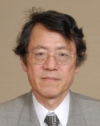
November 10, 2011
Shigeaki Tsunoyama
President
People in Fukushima Prefecture are in deep sorrow facing the Great East Japan Earthquake and the following accident in Fukushima Nuclear Power Plant. In the draft version of the vision for revitalization of Fukushima Prefecture, the following is written. "... some people say that it is too early to talk about revitalization at this stage. However, we do believe that now is the time to put up a flag of hope for revitalization and implement the revitalization plan together with people with one spirit." We are making an effort not only to enhance globalization of the university, but also to contribute to the revitalization of Fukushima Prefecture. In 2010, we undertook the special task to define the strategic research projects which could foster world-class research in computer science and engineering and produce results having a major impact on relevant fields, identifying a few research areas which look more important and more promising for our university's future. As a result, four research areas are selected: Innovative computing (HPC), Advanced network technology (IoT) including Smart grid, Advanced software technology and Cloud computing. The strategic research projects are highly expected to contribute to the disaster recovery and new business creation for Tohoku region and Fukushima Prefecture. The Research Center for Advanced Information Science and Technology (CAIST) was established and three clusters were launched in 2009. In December 2010, Space cluster team awarded a letter of appreciation each from the Minister of State for Space Policy, and the Minister of Education Culture Sports, Science and Technology (MEXT). The Ministers honored its remarkable contribution to HAYABUSA Project of Japan Aerospace Exploration Agency (JAXA). Environment cluster started a collaborative work with the Department of Earth and Planetary Science in the University of Tokyo, Earth Simulator Center in Japan Agency for Marine-Earth Science and National Institute of Agro-Environment Science in 2009. Further, in the 2010 academic year, we added APEC Climate Center at Pusan, Korea to our partners, to develop a prediction system of mid-term and long-term climate change in local area.
In Medical cluster, the cooperative work between Fukushima Medical University and University of Aizu started. After the Nuclear Power Plant accident, application of massive database technology is required to develop long term healthcare of the residents in Fukushima Prefecture.
We would like to make the best use of our results for society and business/industry.
My best and warmest regards to all of you.

November 10, 2011
Shigeaki Tsunoyama
President

2011 THE UNIVERSITY OF AIZU ALL RIGHTS RESERVED